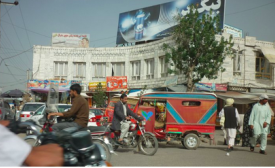united states
Cuban President Raul Castro on Saturday called on the United States to establish civilized relations with his country, recognizing a new tone in bilateral talks on secondary issues while reiterating that the country's political and economic system were non-negotiable. The United States and Cuba have appeared more positive of late as talks around immigration, postal services, disaster prevention and other security issues have taken place, with officials from both countries cautiously welcoming each other's pragmatism and seriousness in interviews with Reuters.
A hot topic these days in D.C. is the quest for what is quickly becoming the foreign policy holy grail — a U.S. foreign policy strategy towards the People’s Republic of China. The quest in many respects makes sense. After the declaration of a “pivot” to Asia, many in America’s foreign policy community expected a major push by the Obama Administration to clearly define some sort of strategy towards Beijing incorporating a number of broad areas of importance — defense, economic, and cultural interactions.
Right after I graduated from college this past May, I went on a bit of an odyssey. I took a trip to Afghanistan. After being away for three years, I returned to the western part of the country where my family resides. I was struck by how much things had changed for the worse in just three years. Three years ago, there was a lot of employment, a lot of optimism for the future, and an overall hope for a better life. However, this time, complete hopelessness, lawlessness, and uncertainty dominated the atmosphere.
In Cuba, a ban on imported vehicles has kept the roads full of classic American cars. But those famously vintage-looking streets could get a modern makeover next year. Today, the Cuban government announced it will lift restrictions on imported cars for the first time in 50 years. The country, which has no car factories of its own, will soon open its borders to imported automobiles, vans, trucks, and motorcycles.
A range of crises in the Middle East dominated the U.S. foreign policy agenda in 2013, raising questions about the vigor of President Obama's Asia "pivot." Four experts offer perspectives on how the region is reacting to U.S. moves in Asia. China has reacted with "assertive authoritarianism," CFR's Elizabeth Economy writes, while Southeast Asian governments remain ambivalent to the supposed shift, according to Tim Huxley of the International Institute for Strategic Studies.
The U.S. Navy will provide military benefits to gay couples stationed in Japan after previously denying dependent status to same-sex spouses there, according to defense officials. The change came after U.S. and Japanese officials agreed to an interpretation of the status of forces agreement between the two nations, concluding that the term “spouses” applied to all individuals who are legally married to Department of Defense personnel.

Right after I graduated from college this past May, I went on a bit of an odyssey. I took a trip to Afghanistan. After being away for three years, I returned to the western part of the country where my family resides. I was struck by how much things had changed for the worse in just three years. Three years ago, there was a lot of employment, a lot of optimism for the future, and an overall hope for a better life. However, this time, complete hopelessness, lawlessness, and uncertainty dominated the atmosphere. Everyone lived in a state of utter fear.
A year ago, Mohammed Assaf was a 23-year-old wedding singer in a Gaza refugee camp. But since he won the “Arab Idol” singing competition in June, in front of more than 100 million viewers, he has become something of a pop superstar in the Arab world. Now, Mr. Assaf is trying to conquer North America, or at least its people of Arab descent.







